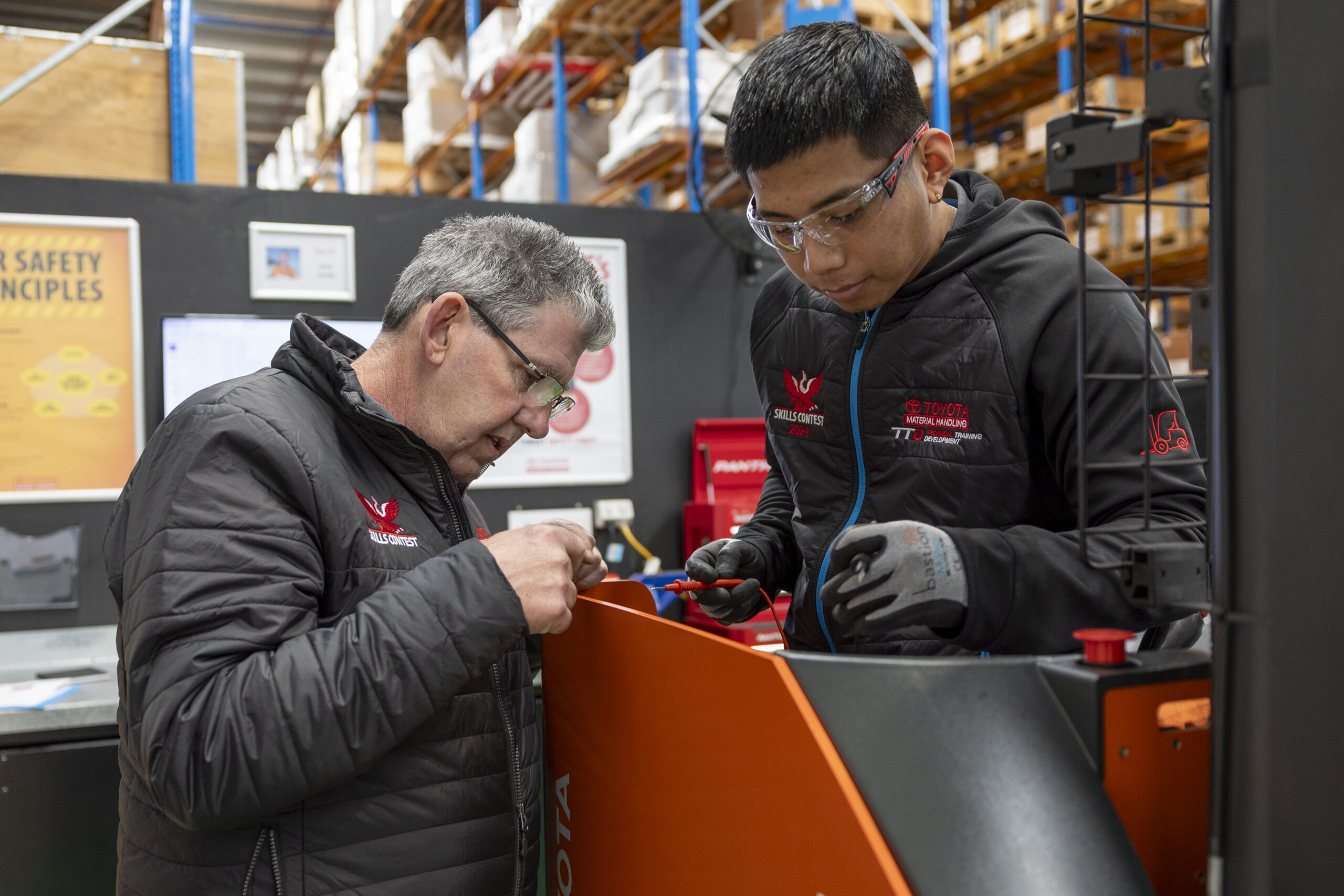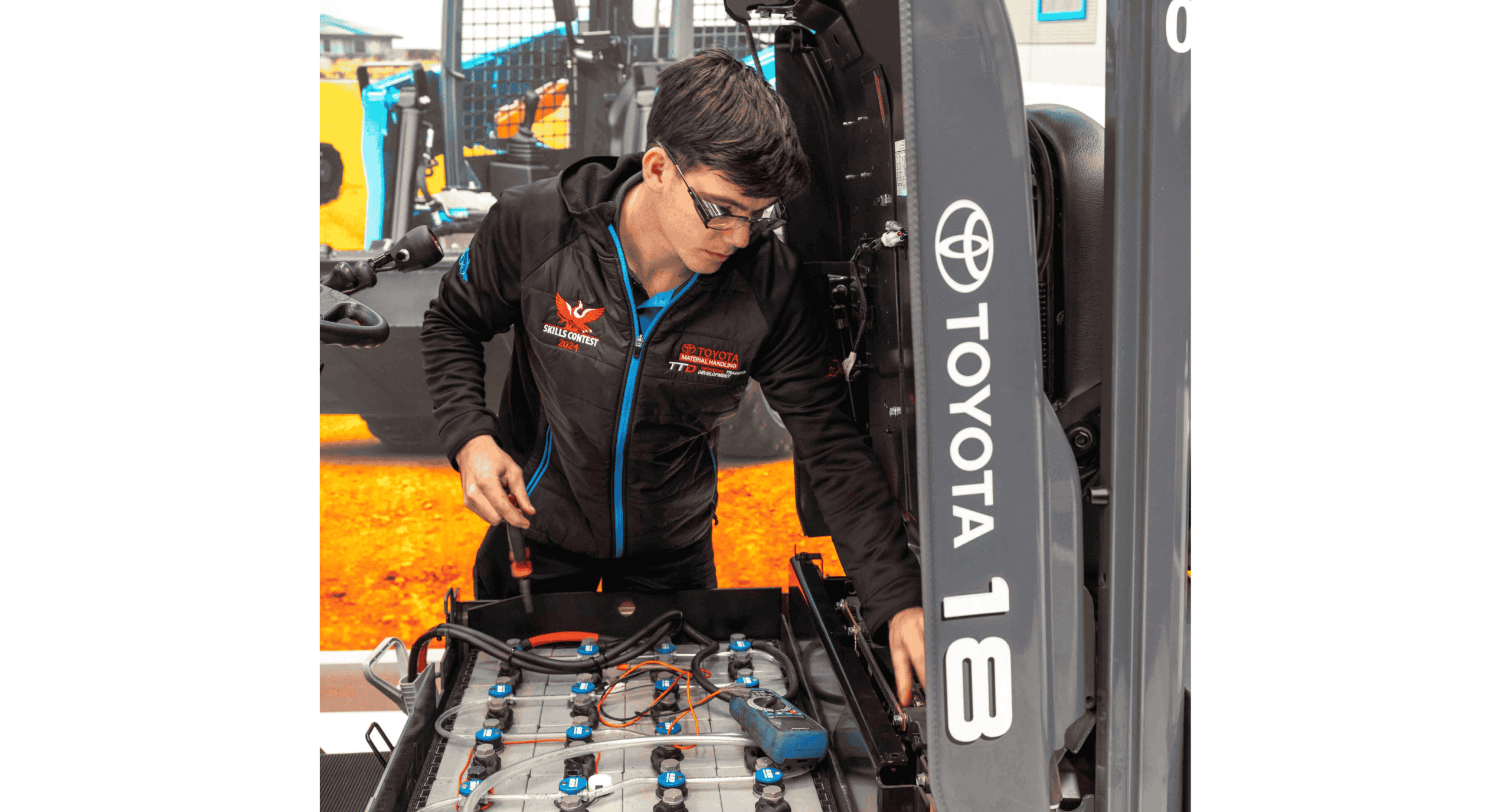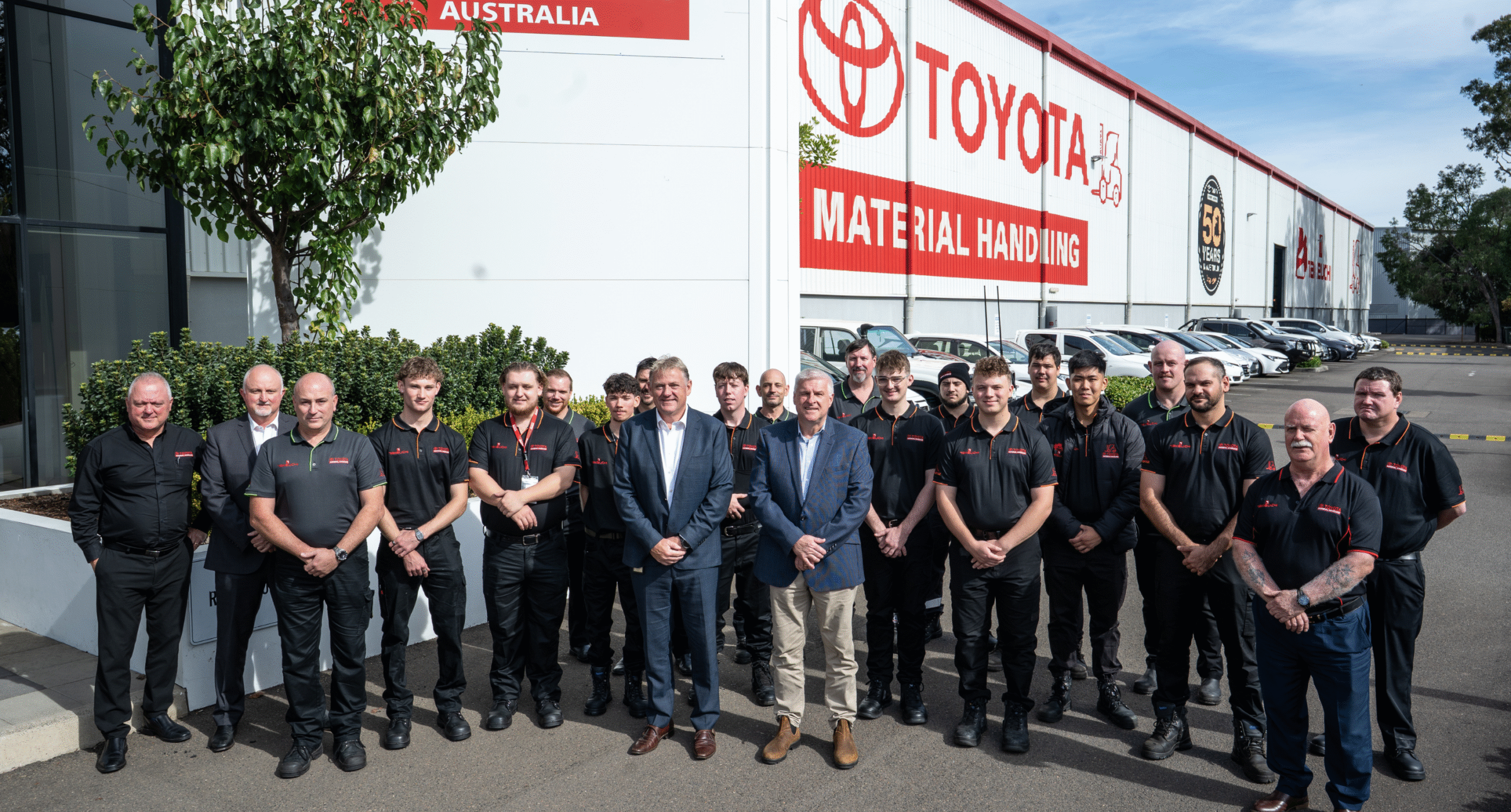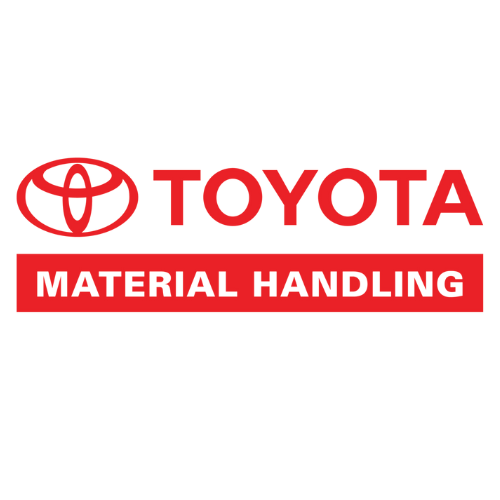Are you wondering how to kickstart a career in the automotive and mechanics industry? Or perhaps you’re just curious about how massive machines like forklifts get serviced and stay in action. Either way, welcome to our guide to auto-related work experience, and get ready to have all your questions answered by the very best in the biz!
To give you some valuable insider insights into what goes on behind the scenes of the automotive and mechanics industry, we’ve teamed up with our friends at Toyota Material Handling Australia (TMHA) to break it all down. Expect a deep dive into the real-world work experience options they have on offer, and job descriptions that show you what a future with TMHA could actually look like. No fluff, no guesswork, just hands-on insight into the tools, skills, routines, and safety practices that keep their equipment (and teams) running smoothly. So, what are you waiting for? It’s time to discover all the exciting things TMHA employees work on every single day!
First Things First: Who is Toyota Material Handling Australia?
At Explore Careers, we’ve had the chance to get to know Toyota Material Handling Australia (otherwise known as TMHA) up close, and trust us; they’re the real deal when it comes to innovation, safety, and serious career potential.
In a nutshell, TMHA is the exclusive distributor of Toyota forklifts and material handling equipment (aka MHE) in Australia, and they’ve been helping industries move smarter and safer for years. With a national network of over 20 branches and a team of more than 850 people, they don’t just offer great products; they offer meaningful careers (especially for those ready to get their hands dirty and learn the ropes in a hands-on trade).
But what really makes TMHA stand out? For us, it’s their commitment to training and supporting the next generation of mechanics/technicians. So, whether you’re joining as a work experience student, apprentice, or full-time team member, TMHA has created a culture that’s all about learning, teamwork, and getting better every day.

What to Expect When Doing Work Experience at TMHA
So, what does a day in the life of someone doing work experience at TMHA actually look like? In the next section, we’ll walk you through what a typical day might look like, from arriving at the workshop and kitting up in safety gear to shadowing real technicians and getting hands-on with mechanical tasks. It’s the perfect sneak peek into what life could be like if you pursue an automotive and mechanics career, and trust us, there’s a lot more to it than turning a wrench. Let’s dive in!
Arrival & Safety Briefing
Upon arrival, you will check in with your supervisor or lead mechanic. Following that, you’ll also need to attend a daily safety talk (this is especially important in mechanical and industrial environments). Then TMHA will get you suited up in super cool PPE such as steel-toe boots, overalls, gloves, and safety glasses.
Workshop Introduction & Tools Check
Next up is an introduction to the workshop layout and safety zones (so you can get familiar with the site). Expect to learn about the basic tools used by material handling equipment (MHE) mechanics, like wrenches and torque tools. TMHA also use diagnostic computers (for modern equipment) and hydraulic testers and battery testers (for electric forklifts), which you’ll be introduced to as well. You may also end up helping with basic tasks like organising tools or prepping workstations.
Morning Repair Task / Inspection Routine
Following that, you’ll be straight into learning from the best! You’ll shadow a mechanic as they inspect or service a forklift or pallet jack, learn about hydraulic systems, engine and motor checks, brake, lift chain, and tire inspections, and battery maintenance (for electric MHE). If you’re lucky, you might even assist with checking fluid levels, cleaning parts, or retrieving tools, too.
During this phase, you’ll also get some supervised hands-on support while learning new things like:
- Replacing filters, hoses, or tires.
- Assisting with bolt checks or part removals.
- Observing a routine maintenance procedure (e.g., 50-hour or 100-hour service).
- Learning to read maintenance logs and checklists.
Diagnostics or Workshop Task
TMHA’s technicians work on troubleshooting issues with malfunctioning equipment; you could observe how they use diagnostics software or meters, isolate electrical or hydraulic faults, replace worn or broken components, and finally help clean parts or prepare them for reinstallation.
Workshop Clean-Up & Review
At the end of the day, you’ll also help tidy up the workshop or parts storage area to get everything looking spick and span. This is also your chance to debrief with the team about what you learned, chat about interesting equipment you saw, and revise important safety points.
Reflection & Logbook
Finally, the TMHA team gives you a little time to update your schoolwork experience log (which you’ll find is often required by teachers). Your supervisor may give you some feedback or tips on what your next steps could be if you’re interested in becoming a mechanic.

Key Skills You’ll Learn or Observe
At the end of your work experience, you should have observed how to safely maintain and repair MHE. You’ll have an (albeit basic) understanding of hydraulics and engines, workshop safety, tool care, and maybe even diagnostic thinking! Most of all, you’ll walk away knowing the importance of preventative maintenance.
Skills You’ll Build (and Why Employers Value Them)
- Basic mechanical skills, such as using hand tools like spanners, sockets, and screwdrivers).
- Preventative maintenance by assisting with fluid checks and top-ups (including engine oil, hydraulic fluid, and coolant).
- Workshop practice by setting up a workbench or organising a toolbox.
- Hydraulic systems awareness involving identifying hoses, cylinders and pumps.
- Basic electrical and battery work, like checking voltage on battery-operated forklifts with a multimeter.
- Technical reading and communication, which involves reading and following simple work orders or job cards.
- Health & safety skills by following LOTO (lockout/tagout) practices.
Plus, what’s just as important as the hard skills mentioned above are all of the soft skills you’ll develop, like time management, teamwork, problem solving and attention to detail!
From Placement to Pathway: Turning Experience Into Opportunity
Ready to take your automotive and mechanical career to the next level? The next step after completing your work experience with TMHA should be talking to your supervisor or mentor about the potential of applying for TMHA’s National Apprenticeship Intake! Pro tip: Use your work experience as a strong talking point in your application and interviews.
Question: How do I apply for TMHA work experience, and what makes someone stand out?
Talk to your school’s work experience coordinator; most schools have a career advisor or coordinator who handles placements, so they shouldn’t be too hard to track down! Ask them about deadlines, insurance requirements, approved businesses, and local employers to get a better understanding of your options and any paperwork or forms you need to complete.
Want to skip the line? Kickstart your work experience journey by contacting TMHA directly using the contact details below:
Phone: 02 8706 6176
Email: kim.cawood@tmha.com.au

What Advice Would Past Students or Current Apprentices Give to Someone Who’s Considering Applying?
Thinking about applying for work experience at TMHA but want some extra guidance? We’ve gathered some of the best tips and real talk from past students and current apprentices to help you make the most of your experience. From how to show up with the right attitude to why small tasks matter, this is the advice they wish someone had given them before day one. Let’s dive into their top tips so you can feel prepped and ready to impress!
Show TMHA How Excited You Are
Just be keen! You don’t need to know everything or be ‘perfect,’ the only requirement is to show interest and be willing to learn. Trust us, tradesmen value attitude more than skill at the beginning. Ask questions, listen carefully, and offer to help even with small jobs.
Always be Willing to Help
Secondly, take the small jobs seriously. Whether it’s sweeping the floor or fetching tools, always be willing to put your hand up; it might seem boring sometimes, but doing it consistently shows you’re reliable. In a workshop, everything matters, even cleaning or organising parts. Plus, doing the basics well can lead to more responsibility during your placement.
Ask Questions
This is a common piece of advice, but trust us, it works! Asking questions shows you care, so don’t just stand there; ask what things are or how they work! Most tradies will be more than happy to explain. Bonus points if you take notes and reflect. During the learning process, writing down what you learned each day helps you remember all the most important parts (and comes in handy with school reports and interviews).
Be Responsible
This goes without saying, but make sure you show up on time every day. If you’re late, it immediately sends a bad message. After all, punctuality is a big deal in the trades, so if you can arrive 5-10 minutes early, that’s even better!
Network, Network, Network!
We’re sure that, by now, you’re already familiar with the phrase ‘it’s all about who you know.’ Good connections in your chosen industry can effectively fast-track your career, so be sure to make the most of networking opportunities during your work experience! Who knows, rubbing shoulders with the right people might even help to turn your placement into an apprenticeship.
Be Present and Stay Safe
This next tip is super important, so listen up! You have to stay off your phone during work time; after all, you’re here to learn! So, put your phone in your pocket and keep your eyes on the job. Being distracted can be super dangerous in a mechanical environment.
Appreciate Work Experience for What it is
Even if you decide the automotive industry isn’t for you after completing your work experience, remember that it was still a valuable experience. It’s totally fine to change career paths, but it helps to have experience to bring across to a new industry, even if it doesn’t seem super relevant. If you look a little deeper, soft skills such as communication, multitasking, time management, and teamwork apply to almost every career!
Kickstart Your TMHA Career Today!
Ready to take the next step in your career journey with TMHA? Whether you’re just starting out or already thinking ahead, there are heaps of opportunities waiting for you. From hands-on work experience to apprenticeships and traineeships, TMHA offers early-career pathways designed to help you grow your skills and kickstart an exciting future in the mechanical and industrial space.
Keen to learn more? Check out Work Experience, Traineeships, and Apprenticeships on TMHA’s careers page today. Your future could start here!

